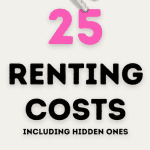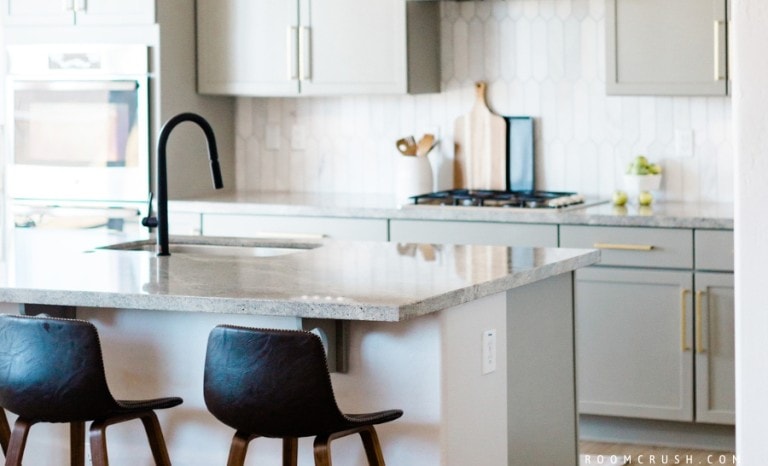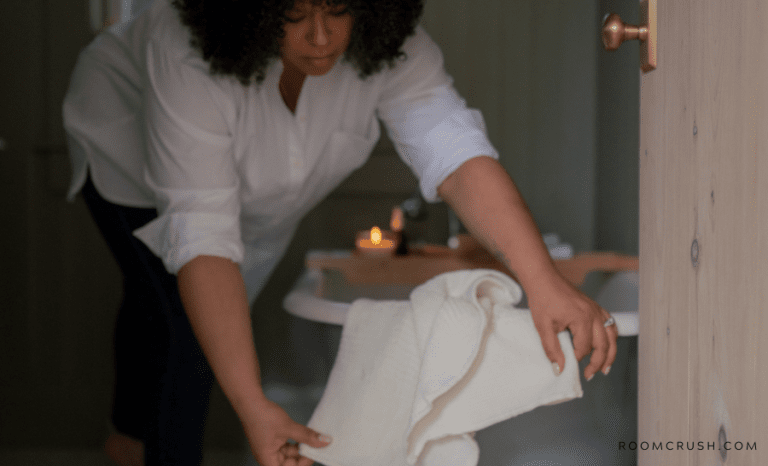25 Renting Costs (Including Hidden Ones)
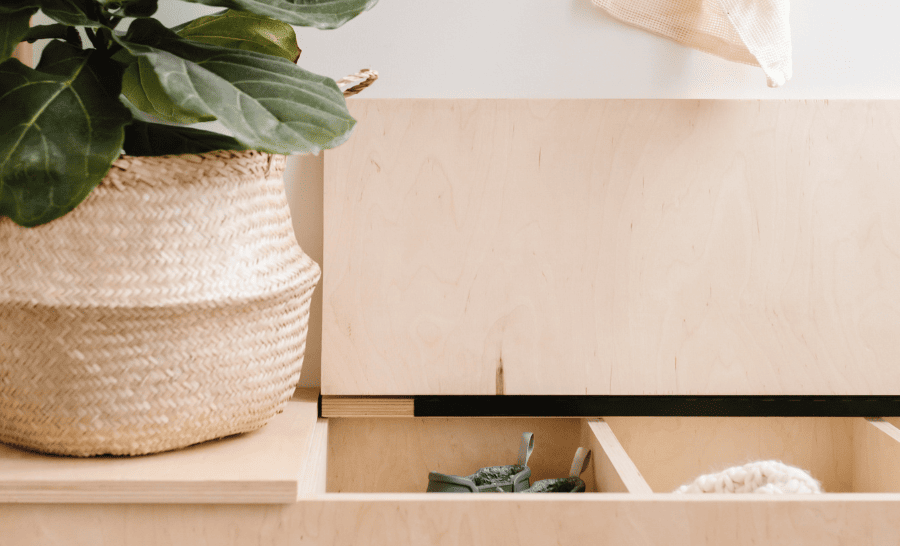
Renting an apartment or home for the first time is fun and increases freedom and independence. But it isn’t free.
And paying a bill once a month for the space is not the only cost. There are many other factors involved and some hidden costs you may not have thought of.
In this article, learn about the 25 renting costs that you can expect and hidden ones that you should be aware of.
This site uses ads and affiliate content as an Amazon associate earning on qualifying purchases. Disclosure.
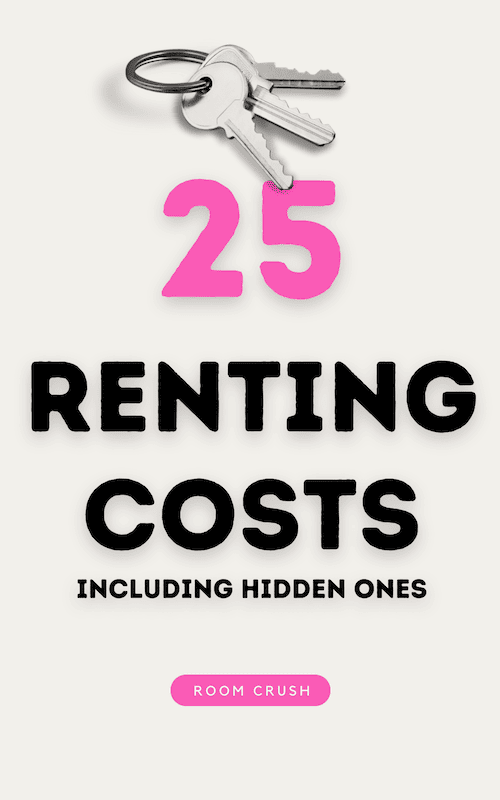
What are the Costs to Rent an Apartment Per Month?
Let’s start with the most apparent payments. What amount will you pay each month for an apartment?
Depending on where you live, a two-bedroom apartment can cost as little as $500/month to upwards of $3000/month.
Many factors may affect your price, so there really is no general answer. Things like the cost of living in your area will affect how much you end up paying. If you live somewhere expensive, such as New York City or Los Angeles, you can expect to pay more than if you live in the midwest. Then again, whether you live in a large city or a small town can also play a role in what you pay.
To get the best idea of rental costs per month, check out newspapers and look online at apartments for rent in your town. Seeing the costs should give you an average amount to aim for.
What Costs Are Involved in Renting an Apartment?
It isn’t just the rent check each month that matters. There’s also the price of utilities (electricity, gas, water, etc.). Some apartments add utilities to the overall rent price, but others expect a separate payment.
Then there are costs you pay for conveniences. Conveniences are things like internet and television streaming services. Stuff that you don’t have to have, but most people need or want in their home. Pet fees may also apply if you have a dog or cat with you.
When you move in, it is also likely that you’ll need to pay a deposit. There may also be other extra costs in your first month as a renter. Just remember to add everything up, so you aren’t surprised by the amount. Doing this will also help you save and budget effectively.
Need some help around the house? Use Task Rabbit to hire handypeople, movers, and cleaners!
Typical Additional Costs When Renting an Apartment:
- First and last month’s rent deposit
- Pet fees
- Security deposit
- Utilities (water, gas, trash, electricity, laundry service)
- Internet, Phone, Streaming services
- Parking spots fees, Garage rental
Upfront Renting Costs?
First, let’s talk about the costs when you first move into an apartment. Some of these only apply when you move in and are not things you will need to pay on a constant basis.
But when you add them up, all these costs can get quite expensive. It’s important to be prepared for them before taking on a move.
There can be some variance with costs, and you may find that not all of these expenses apply, but a lot of them will. Again, your location and what type of place you move to will affect the pricing a lot.
Application Fee
One of the first expenses you’ll deal with when renting an apartment is the application fee. You have to apply to see if you qualify for the apartment in the first place, and there is generally a fee associated with that.
Your costs will be somewhere between $25 and up to a couple of hundred dollars, depending on where you are trying to rent. On average, you will probably see costs around $50 per applicant or application.
Security Deposit
Your security deposit is charged when you first move into a new place. It protects the landlord’s property if they need to clean it or repair it after you leave or for other charges if necessary.
If you take good care of the property, you may get your deposit back when you move out. Usually, though not always, your security deposit is around what you’d pay for a month of rent.
First And Last Month’s Rent
Some rentals require the first and last month’s rent. This protects the landlord if you don’t make your payments.
Not every place requires you to pay two months of your rent, but there will likely be other fees if it does not. It’s good to be prepared to pay this in case the landlord asks for it.
Do you need to supply any appliances?
A lot of apartments and rentals come fully furnished, including a washer and dryer. But some will have the hookups but not the washer and dryer, or there may be another appliance you need to bring with you, like a microwave.
Be sure you know what they provide and what you need to buy before you move in or sign paperwork.
Will you need a pet deposit?
A pet deposit obviously does not apply if you don’t have a pet. If you are a pet owner, more than likely, you’ll need to pay some fees when you rent.
When you move in with a pet, a pet deposit may be charged. The amounts vary for this. Expect the deposit to be in the hundreds for most cases.
Many apartments also charge a monthly pet rent fee ranging from $25 to $100 per pet per month.
How much will it cost to move?
In addition to the fees, deposits, and rent expenses, it also costs money to move. You may rent a moving truck, hire movers, or have other costs. Add this to your moving budget.
Recurring Rental Expenses
Some costs are not one-time fees but recurring expenses charged every month or every few months. These should be part of your monthly budget.
Rent
The amount that you’re charged each month for renting an apartment, condo, or house. This will usually be the same amount each month and prices can vary by your location and cost of living in your area.
You might pay by check or have an automatic monthly withdrawal set up.
Related: Is Renting a Waste of Money?
Renter’s Insurance
Renter’s insurance can protect your property and help you in the event of theft or damages to the things you own. While it isn’t always required, some landlords will want you to have it.
And regardless, it’s a good idea and is usually very inexpensive. If something happens to your personal belongings inside the apartment, it likely will not be covered by the landlord’s insurance which is why it’s important to have your own coverage.
Who pays for pest control?
Find this out before you agree to your rental terms. Typically, the landlord will pay for pest control, but the tenant may need to pay in some circumstances.
Make sure to check out what the case is for your particular situation. Your apartment may do regular treatments but charge a fee of $25 to $100 for additional requested treatments.
Parking/garage fees
Parking fees will depend on where you live. Some places have open parking, or sometimes you pay for a parking space or carport.
There can be an extra fee depending on your options. Make sure to check it out before signing your lease.
Some apartments offer covered parking spots or garages for rent. These typically fill up quickly so if it’s important to you, ask the apartment manager about vacancy before you sign the lease. You may have to be put on a waitlist.
Gas
You may have costs each month for gas. This may be grouped in with other charges, and amounts can vary.
It can change depending on how much you use, but you can probably estimate an average amount after a few months.
Electricity
The landlord should know the average electric bill for your type of rental; they can probably help you understand what to expect. You may be charged by how much electricity you use.
Water
Sometimes the water is paid by a landlord and added automatically to rent costs, and sometimes you pay it separately. You need to look at your lease and find out the prices per month for water, to get an exact number.
Monthly Pet Fee
These are monthly payments that you make for your pets. The amounts can vary, so you need to check what the rate is for your rental.
Remember to be responsible and make sure your pets don’t damage the rental unit so you aren’t charged larger fees later.
Internet
Most people won’t consider living somewhere without the internet, especially if you work from home. Your internet price will depend on your specific plan and the company you use, but you should factor it into monthly costs.
Cable
You may want to add cable television to your home costs each month. This is your responsibility and not something your landlord will likely pay for.
Many people prefer streaming services like Netflix now, but there will still be a cost.
Extra Storage Spaces
If you have a lot of stuff, you may need to rent a storage unit to hold onto some things that won’t fit in your apartment or rental house. If that’s the case, check out what the monthly charges are and make sure you’re comfortable paying it, in addition to your other bills.
Amenities
Your amenities will likely get included with your rent, but there can be some variation depending on your situation. Some things could cost extra, so make sure you add them to your payments if you want them.
Trash
Trash is usually an inexpensive part of your monthly bills. Check your lease to see what the cost is and whether the trash bill is grouped with other utilities.
Laundry
You might have a washer and dryer in your apartment. But many people rely on coin-operated laundromats or the laundry room of their apartment rental. Be prepared for weekly charges for laundry.
Hidden Costs of Renting
Consider these charges that are easy to overlook or may be hidden before you sign a lease. Remember that there can be various expenses depending on your particular residence.
Here are some questions to ask yourself before renting to determine hidden costs.
Will you have to make any repairs?
Is the rental unit in good condition? Or will it need some updates when you move in?
If it does need repairs, what are the costs, and who is responsible for them? Know before you sign.
Maintaining the yard (for a house)
This is a cost that is often forgotten. But if you rent a house or a condo, you may have a yard. Sometimes, you’ll be responsible for keeping it up and making sure it stays tidy.
This can mean mowing the lawn, watering, and maintaining the property. Think through what the yard needs and average out the costs.
Are there any membership fees (condo fees, HOA)
This is something to ask about before renting. Some condos have fees, and some houses are subject to HOA expenses.
Since you’re the one who will be living there, you’ll likely need to pay for these yourself. Ask what the monthly charges are and if there are any annual fees or extra costs.
Cleaning Fees/ Move Out Fees
When you move into a new place, it will need a thorough clean first. Even if the previous renters cleaned before they moved out, you may still want to tidy up.
Plus, you need to clean the place you are moving out of to have a higher chance of getting your deposit back.
If you want to pay less and do it yourself, you will still need to buy some cleaning supplies. (Things like disinfectants, trash bags, etc.)This could cost you a bit of money, but probably less than $100 unless you need to buy a lot of stuff.
Hiring professional cleaners is another way to go. Fees vary, and they may bring their own supplies. It can save you time but may be more expensive than the DIY path.
Move-out fees can cost up to a few hundred dollars. The fee isn’t huge, but it’s good to prepare for it instead of being surprised.
What are the costs if you need to break your lease?
Some circumstances may cause you to move out sooner than planned before your lease is up. If this happens, it can cost you some money.
Breaking your lease might cost you one or two months’ worth of rent. There may be other costs, as well.
Be Aware of the Fees Associated with Renting So You Can be Prepared
Renting is a great way to gain independence and be out on your own before buying a home. Many people rent for a variety of reasons but remember that renting is not cheap.
It’s essential to know all the costs, including hidden ones, so that you can be prepared.
When you expect fees, you can calculate how much money you’ll need to rent and start saving up. If you give yourself time, you can save up the correct amount you need without stress. Renting can be a great experience, which will be made much better by knowing all fees.
Related Articles:


